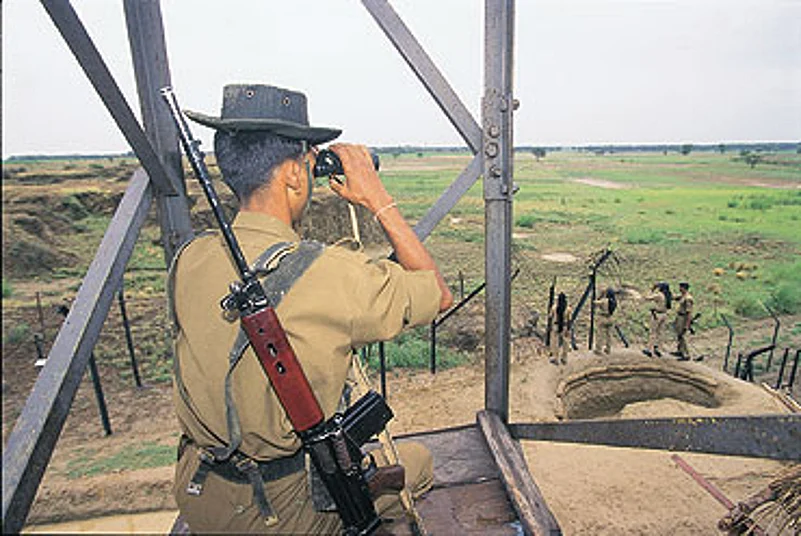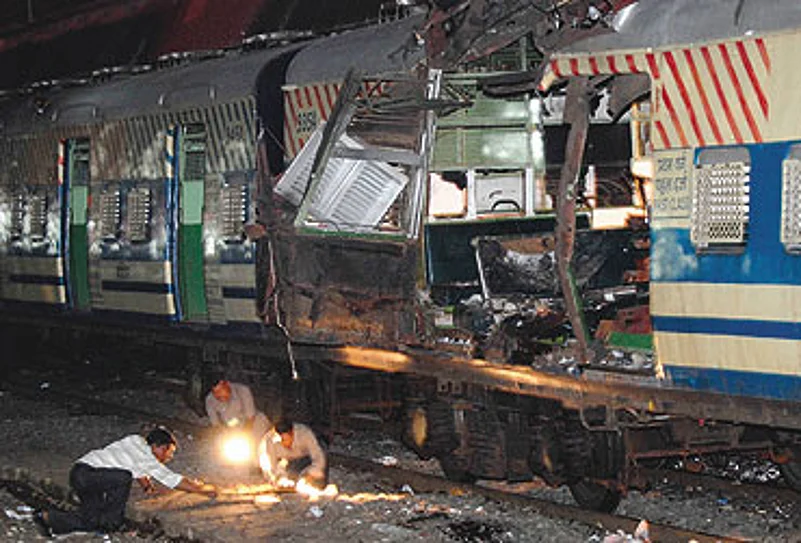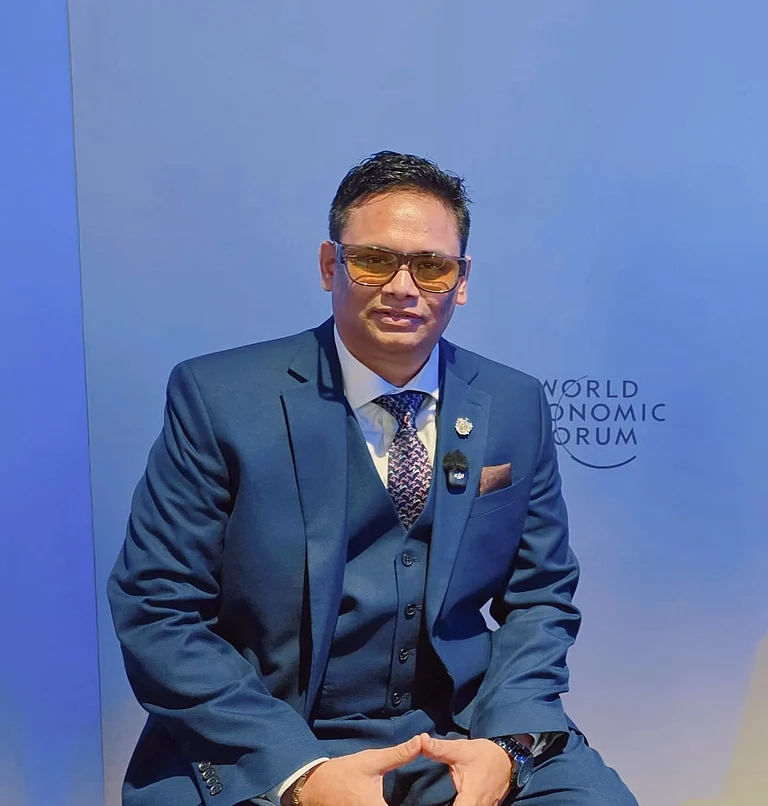What Are The Options Before The Security Agencies To Fight Terror?
Across The LoC
Strike At The Roots
- Initiate covert action against religious heads and establishments in Pakistan and Bangladesh fanning jehad
- Exploit sectarian differences in Pakistan and Bangladesh to act against elements in the ISI and Director General FieId Intelligence (DGFI), both of which are known supporters of terrorism
- Build better relations with the intelligence agencies of Iran and Afghanistan
- Ask US, international community to increase pressure on Pakistan
- Collect hard, credible evidence that nails the ‘foreign hand’
- Learn from past failures like Kandahar and Operation Parakram
Never a credible option since it could escalate into a full-scale war. It would also put world pressure on India for starting hostilities.

Indian security forces watching over the Punjab border
Inside India
Beef Up Security
- Improve the coordination between central and state intelligence agencies
- Allocate more manpower and resources to human intelligence to monitor terrorist groups
- Improve patrolling of porous borders with Bangladesh and Nepal
- Put in place a new approach to dealing with the Muslim community
- Prevent alienation by identifying and talking to those leaders of the community who matter
- Show more flexibility and political will in resolving the complex Kashmir issue
- Bring tough anti-terror laws that crack down on terrorists and hawala operators who provide logistical support
- Upgrade existing security doctrines to make agencies stay ahead of the terrorists
- Counter jehadi propaganda through awareness campaigns
***
A day after the Mumbai blasts, Prime Minister Manmohan Singh called a meeting of India’s top security brass with a single-point agenda. How could India respond to repeated terrorist attacks and offer a deterrence credible enough to ensure Mumbai—or any other city—does not have to go through another 7/11? As the intelligence chiefs mulled over options along with the heads of the armed forces, a consensus began to emerge. A combination of diplomatic offensive and political will would be an apt response to the blasts. India would keep its options on covert punitive action open against those who promote terror from across the border.
On the domestic front, security agencies recommend a strong anti-terror law—albeit one sensitive enough to prevent further alienation of the Muslim community. Intelligence officials concede communal riots have only provided a moral fog that breeds terrorism. Thus, while intelligence agencies keep a close watch on local terror modules, the political establishment will have to simultaneously open channels with Muslim leaders who matter. "The idea is not to appease but try not alienate Muslims or paint them all with one brush. Confidence-building measures are a must so that the community doesn’t feel that it is targeted," says a source.
"The brief is clear," a senior intelligence official told Outlook after the meeting with the PM. "We wait on the hard option. If the terror continues, we will then be forced to reorient our strategy towards a more punitive response. That decision can take place as soon as the next terror attack. The general consensus was that we are yet to cross the threshold."
In the immediate term, security agencies are weighing the options that could be translated into action. One component of this is to strike at the roots of terror in Pakistan and Bangladesh. An Israel-type option, unfolding now in Lebanon, is a complete no-no—the intention is to target ‘religious’ bodies promoting jehad against India. "We know who they are and what they do. If necessary, they can be neutralised. It all depends on whether we are pushed to a point that necessitates such action," sources said. India has been tracking LeT chief Hafiz Mohammed Saeed, who was released from house arrest by Pakistan on February 20 this year. Saeed is one of the seven signatories, along with Al Qaeda’s Osama bin Laden and Ayman Al Zawahiri, to a 1999 pact that resolved to spread terror in India and the West. Tabs are also being kept on other heads of Pakistan and Bangladesh-based outfits.
There is one school of thought that says planning, watching and waiting is meaningless. Former RAW chief Vikram Sood says: "A response to terror has to be immediate and within the optimal time-frame. If there has to be a retaliatory strike, it must be carried out in the shortest possible time." Otherwise, he says, "there is little use deliberating over these issues."
As the doctrine itself is debated, India is looking at sectarian faultlines in Pakistan/Bangladesh, which can be exploited to India’s advantage. For example, Waziristan on the Afghan border has seen a growing insurgency and a heavy military response. A separatist turmoil has been on the boil to the south, with the Balochis up in arms against "Punjabi dominance". These are seen as vulnerable points, ripe for the launch of intelligence operations inside Pakistan. The influx of Bangladeshi ‘economic refugees’ into India also offers an ethnic pool that can be tapped to form a source of vigil back in Bangladesh.

Sleuths search for clues on the tracks after the Mumbai blasts
India is also looking at beefing up the strategic relationship between Indian intelligence agencies and their counterparts in Iran and Afghanistan on the west and Myanmar in the east. Sharing intelligence and conducting joint operations could help shore up the first line of defence against terrorism in India. The existing relationship, sources say, is not being exploited to its full potential. India’s rapport with American intelligence, meanwhile, has been hit by the recent espionage case where a third secretary in the US embassy in New Delhi was caught sourcing secret documents from three intelligence officials. Earlier, CIA representatives would be given regular updates by RAW—this has now been discontinued, say sources. The last major presentation on Pakistan and Afghanistan to the US intelligence community by Indian agencies was done during President Bush’s visit last March.
The present crisis has set off a much-needed reappraisal—it is now acknowledged that India’s intelligence apparatus has slackened. Soon after the Mumbai blasts, the PM told journalists that "we had macro-level information. But at the micro-level, we did not have specific intelligence that this particular target would be attacked this time". On July 20, he again said, "Our past responses have been inadequate in dealing with terrorism, which is of a different intensity and magnitude."
However, it will take a lot more than promises to plug the systemic failures that has hampered Indian intelligence for years. Sources say that ever since M.K. Narayanan, a former IB director, took over as the national security advisor, it has been tough going. Traditionally, intelligence chiefs would brief the PM directly. The present heads have been asked to brief Narayanan instead. It is then left to him to brief the prime minister. Narayanan, reputed to be a micro-manager, has so much on his plate that he has not been able to address key issues to improve the overall security scenario, say intelligence veterans.
A key indicator of the systemic lacunae is the nearly defunct status of several intelligence institutions. The intelligence coordination group, the technical coordination group, the strategic policy group and the national information board have not met in over a year. This has severely hampered coordination between the plethora of agencies tasked to gather intelligence, leading to turf wars or needless duplication of effort.
Even the functioning of the Intelligence Bureau, India’s premier counter-intelligence organisation, has come in for criticism. "How can we expect the IB to function if a large part of its resources is directed at serving the ruling political party of the day," rues E.N. Rammohan, a member of the national security advisory board. "Instead of concentrating on security issues, they are busy chasing the Opposition so that the ruling party is kept in power. Is that the job of the IB?"
To be fair to the agencies, they have never received credit where it was due. In the past year, the IB notched up many ‘hits’—busting nearly 65 terror modules. The subsidiary intelligence bureau in Kashmir too neutralised over 60 LeT divisional commanders. "The successes far outweigh the failures but unfortunately, only the latter gets publicity," says an analyst.
As India searches for a credible response in the aftermath of Mumbai, the security agencies feel an episodic approach will not bring any long-term benefits. "We have to think long-term and avoid blunders such as Operation Parakram in the aftermath of the Parliament attack or the Kandahar hijacking," says an intelligence official. In fact, during the Kandahar crisis, options such as using Iran as a base to launch a rescue mission were finally abandoned. This has given credence to the charge that India has been "soft" on terror.
The advocates of the grandiose "hot pursuit" theory find no takers within the security agencies. "Our contingency plans are ready to respond to a crisis at any level and can be implemented on the orders of the government," says Lt General Shantonu Chowdhury, former vice chief of army staff. "But any decision must be carefully weighed before steps are taken," he cautions. Even former RAW chief A.S. Dulat, who also has the unique distinction of having had a long career with the IB, agrees that any punitive action would eventually prove to be futile. "We must remember that unless the core issues of Kashmir and Pakistan are not addressed, we will have to continue bracing ourselves for similar terrorist attacks. I personally think that the prime minister’s response is almost perfect."
So far, Manmohan Singh’s calibrated toughness has won much appreciation within the security agencies. They feel that it has shown the right measure of statesmanship and resolve to combat terror. Now is the time, they say, to convert that resolve into action on the ground.


























